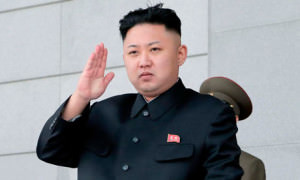What is the Extent of Kim Jong-un’s Power?
By: Katie Smith
North Korea has proven itself to be a knot of confusing military decisions, cloudy government roles, and secretive—yet under-developed—military plans.
Past North Korean military actions received a lot of media attention. On May 20, CNN reported North Korean projectiles of unknown had been launched off the country’s eastern coast. These missiles are the latest in a series of “tension-creating acts” against South Korea. The North Korean military raised and subsequently lowered a missile in the direction of U.S. bases in the Pacific earlier in April.
While North Korea has withdrawn its declaration of war against the United States and its allies, it is clear that the country has the ability to eventually create nuclear weapons that could potentially reach North America, how much of it is true, and how much of it is based in Kim Jong-un’s urge to create military confidence in his budding regime?
Communist countries have a long-running history of governments controlled by the leaders’ cults of personality. When Vladimir Lenin, the founder of Marxist-Leninism, died in 1924, his body was filled with wax and entombed in a glass sarcophagus so that the people of the Soviet Union could visit their beloved leader. Children growing up during the Cultural Revolution under Chairman Mao Zedong were taught from the leader’s book of quotations and forced to recite them in schools.
North Korea’s communist political history—beginning in 1948 with the creation of the Communist party and continuing into present day—is no different. Three family members have run the country consecutively since the party’s birth: Kim Il-sung, Kim Jong-il, and Kim Jong-un.
[pullquote]It’s always difficult to infer what North Korea’s plans are. The country’s borders are closed to most travellers, and the government itself is even more secretive. [/pullquote]
The Chairman of the Military Defense Council Cho Myong-nok was poised to assume Kim Jong-il’s position as supreme leader. Cho died of a heart attack in December 2010, causing a scramble to find a new heir to Kim’s position.
According to the New York Times, Kim Jong-il rewarded his son with powerful positions in the Korean Workers’ Party. Kim Jong-un was also made a four-star general on September 27th, 2010, even though he has never served in the military. The North Korean government was concurrently planning Kim Jong-un’s debut to the North Korean people.
Kim Jong-un’s rise to power began following the death of his father, Kim Jong-il, in December 2011, leading to suspicion regarding the validity of Kim Jong-un’s certifications of power and whether succession by a member of Kim Jong-il’s family was as inevitable as it seemed.
Under Kim Jong-il, North Korean propaganda and political rhetoric were both relatively friendly and predictable compared to what the country has been producing recently. Conversely, Kim Jong-un’s regime has shown the young leader speaking of war with the United States and South Korea. The Peninsula, a blog dedicated to following the foreign and economic policies in the Korean Peninsula, tracked the number of times the words “war,” “nuclear,” and other aggressive words were used in North Korean rhetoric. The usage of negative words jumped 350 per cent from Kim Jong-il’s regime in 1998 to the early days of Kim Jong-un’s in 2012.
It’s always difficult to infer what North Korea’s plans are. The country’s borders are closed to most travellers, and the government itself is even more secretive. Very little is known about the actual distribution of power within the North Korean government, and what is known is very basic. The Supreme Commander of the Korean People’s Army is the highest position in the government, and the one that Kim Il-sung, Kim Jong-il, and Kim Jong-un have held.
It has been suggested that Kim Jong-un is attempting to gain favor from the military and prove that he is able to lead as his father did by using nuclear threats and threats of war against South Korea and the United States.
Kim Jong-un possibly attempted to gain the military’s confidence in his regime with his threats of war and the raising of nuclear weapons in the direction of the United States. Prior to the country’s failure to successfully launch a missile on April 13, Kim tried to maintain a comparatively visible regime. The mistake possibly discredited Kim Jong-un in the eyes of those in the military, and pushed him to develop a more abrasive approach to foreign policy to solidify his place as Supreme Commander.
While Kim Jong-un struggled to gain the favor of the military community, he had no issues attempting to convince the public. North Korea is notoriously isolated from the rest of the global community, and such isolation allows North Korean citizens to remain blissfully unaware of the true strengths of the country’s enemies and place their faith completely in the government’s hands. The self-proclaimed divinity of the ruling family adds to such faith. Kim Jong-un’s birth has been touted as “heaven-sent,” and the new leader fashions himself as “a reincarnation of Kim Il-sung.”
North Korea has a history of threatening its enemies at a whim and not following through (as was the case in April of this year). The new leader of North Korea, however, has left pundits and experts guessing. Kim Jong-un did not enter a period of mourning like his father did after the passing of Kim Il-sung; rather, Kim Jong-Un plunged himself into the leadership merely months following the death of Kim Jong-il. Consequently, little is known about Kim Jong-un’s training for leadership due to its brevity.
































Share the post "What is the Extent of Kim Jong-un’s Power?"